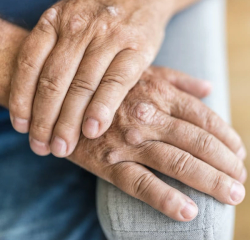
OR WAIT null SECS
Geeta Nayyar, MD, MBA: Concerns for Rheumatology Patients Regarding COVID-19
Rheumatology patients are more susceptible to infections, making self-quarantining extremely important for this population.
Geeta Nayyar, MD, MBA
Amid coronavirus disease 2019 (COVID-19), healthcare workers and patients alike are experiencing heightened anxiety. Many are quaratining and practicing social distancing and isolation to stay safe. For patients with rheumatoid arthritis or other chronic conditions, these practices can be essential.
In an interview with HCPLive®, Geeta Nayyar, MD, MBA, chief medical officer at Greenway Health, discussed primary care concerns, the rise of telemedicine, and the importance of rheumatology patients quarantining.
Editor's note: This interview has been lightly edited for style, length, and clarity.
HCPLive: What concerns have you heard from colleagues in the primary care community?
Nayyar: The biggest concern, number one, is that there’s lot of anxiety right now, so a lot of people are calling the doctor. And, certainly in Florida, it's allergy season. Many people are calling in with a cough, cold, and things that are not the coronavirus. Given the resource issue, this is certainly a concern from the standpoint of access to doctors, and then also just taking up time and supplies in the office.
A lot of my primary care colleagues have gone to telemedicine and are fielding a lot of this on the phone and on video now. It's so it's so wonderful that now telemedicine codes have been open. So, because of this, capacity is really opening up. And not to mention just regular primary care patients who need to get in. They need their diabetes checkup, their insulin, their blood pressure medications, their prescriptions or lab work done.
The concern is that now you could have a population that gets infected just by virtue of going to the doctor's office and then folks who are also just not understanding what the true symptoms of the coronavirus are versus just a cough, cold, or sinus infection.
HCPLive: You briefly mentioned telemedicine. Can you elaborate on the importance of the technology during a time like this?
Nayyar: I'm super impressed with how creative everyone has gotten. Personally, I’m working the COVID-19 hotline at the University of Miami. I think everyone is getting super creative. And I'm really excited to see this opening up capacity and both doctors and patients embracing it.
They say that necessity is the motherhood of innovation. And I think this couldn't be a better example. I think it's going to be very hard to put the genie back in the bottle after this. I think it's wonderful that we have so many people thinking outside the box and getting access. This is really about getting access and being safe about it and not having to sit in the waiting room and exposing doctors and staff unnecessarily to patients that can be handled on phone or video chats. I think it's wonderful.
HCPLive: Rheumatology patients are more susceptible to infections, particularly if they're taking medications like glucocorticoids that are associated with high rates of infection. Should doctors be tapering patients from these medications, at least until COVID-19 simmers down?
Nayyar: Any patient with an autoimmune disease is battling the environment that they're in every day. They could have a spouse that has something. They could have something at work. So, the answer is that it's a very individual, case by case basis because the balance that we have to always do in rheumatology, it's the balance of suppressing the immune system so that lupus, rheumatoid arthritis, psoriasis, etc. stay well-controlled, and that you also don't disable the immune system so much that someone gets an infection. That is a day to day worry for any rheumatologist and that is the everyday battle. This is really no different and it really is a case by case situation. It's hard to get behind a general statement like that.
HCPLive: Is it particularly crucial for this patient population to self-quarantine?
Nayyar: Absolutely. And the same for patients with COPD, asthma, and other chronic conditions. That population and those that interact with them need to be much more careful.


